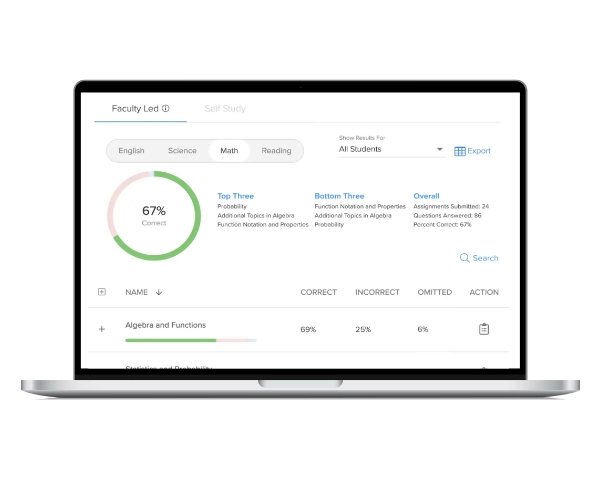Second of a two-part series
In our last blog post, we looked at the impact—if any—on high school students who take AP courses, since some colleges no longer require SAT or ACT test scores for admissions. Let’s take a deeper dive into this topic. Specifically, let’s look at what purpose AP courses serve if higher education programs don’t require college entrance exams, or are, in fact, completely test blind.
“The benefit for students to take AP classes is still incredibly high,” said Philip Bates, UWorld’s Director of College Prep. “Test scores or not, they still need to experience a rigorous curriculum, such as AP, to be prepared for college-level courses. They still need to learn and apply critical studying skills—taking notes, writing essays, learning and processing high quantities of complex information—to be successful in college. Being successful in AP classes helps build those skills and the confidence needed to pursue a college degree,” Bates concludes.
According to Get Schooled, a national organization dedicated to helping young people get into college, many universities still use SAT or ACT scores to award merit scholarships to incoming students. If they perform well on an entrance exam, those scores could substantially benefit a student’s financial aid. Get Schooled expands upon this idea by claiming that up to 60 percent of scholarships require an SAT or ACT score submission as part of the application process.
Regardless of potential scholarships, Get Schooled says a lack of test scores means other parts of a student’s application develop an even greater significance: grade point average, college essay, awards and achievements, extracurricular activities… Without entrance exams, these become highly influential in the application process.
In a test-optional world, should parents suggest their kids no longer “unnecessarily burden” themselves in high school with AP courses?
“That’s a big mistake,” Bates stresses, “and will only set the child up for a rude awakening once at college. As a parent, you want your child to fail and learn in a safe place, and a high school AP course is that controlled environment. While I don’t think taking multiple AP courses each year is the ideal scenario for every student, some college-bound students can take one or two AP courses in high school and be both challenged and adequately prepared for college. Other students can take three, four, or even five AP courses and be happy, challenged, and successful.”
In some schools, principals are considering the possibility of doing away with AP courses in order to cut back on the use of campus funds. Bates has words of caution there, too, saying it would be a great disservice to the students, community, and teachers. His reasons for such a claim?:
- Students need AP courses to prepare for college
- Community members need to support college-bound students so they can eventually contribute to the community by working in well-paying jobs
- Some teachers need to teach a rigorous curriculum in order to stay engaged and stimulated in the classroom
While test-optional admissions may be here to stay in some capacity, Janet Godwin, Chief Executive of the ACT testing organization, recently told The Washington Post that colleges still want to see test scores to help with the admission and scholarship processes. “People ask me all the time, ‘Is this an existential crisis for the ACT?’ And my resounding answer is, ‘No!’ … From our point of view, more information is a good thing.”
Bates agrees, believing that the limited role of standardized testing in admissions has been fueled, in part, by the pandemic. On the bright side, he points out how this has actually benefited the ACT and College Board, as it has forced them to reflect on their assessments, courses, and how they can improve.
“The SAT exam is changing dramatically in the coming years. The new test will be shorter, digital, and adaptive. The verbal section is changing, and students will be able to use their calculators on the entire math section,” Bates says. “These are all very positive changes for students, and ACT will surely follow with similar changes. The new changes go into effect in spring 2023 for international students and spring 2024 for domestic students. Early feedback on the field tests has been very positive. These changes will also improve test security, which has been an issue in the past.”
To read part 1 of this blog series, please click here.
What features are built into UWorld’s Learning Tools for AP Courses that serve students well beyond passing the exam?
We make complex content easier for students to understand. Students practice with our exam-like questions and learn from immediate feedback given in our explanations. Interactive study tools and vivid images help reinforce concepts and aid in retention so that students master college-level content. This knowledge can be applied to AP exams or help lay the foundation for future college courses. Learn more about our courses here.
References: Sammy Allen, Tips for Starting the College Search, US World News & Report, July 8, 2022.




